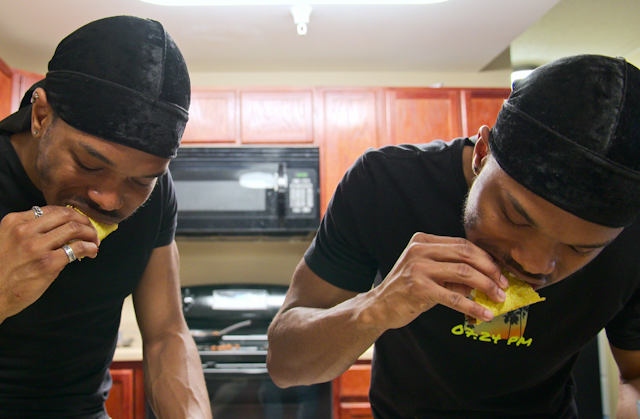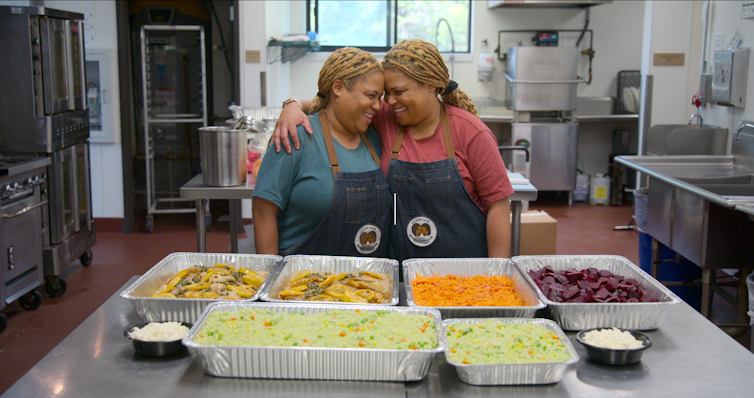Netflix’s You Are What You Eat uses a twin study. Here’s why studying twins is so important for science
- Replies 5

Still from You Are What You Eat. Netflix
A new Netflix documentary, You Are What You Eat, showcases sets of identical twins as they adopt different diets. For eight weeks one twin follows a vegan diet while the other one follows an omnivorous diet. The experiment is compelling because, being genetically identical, the health of each twin is very similar before the trial.
I won’t spoil the ending for those who haven’t seen it, but if you prefer the drab writings of academics over the glitz and glamour of Netflix, you can read the published paper in the journal JAMA Network Open.
The documentary underscores the extraordinary contribution twin studies make to advancing our understanding of the world. But this goes well beyond comparing different diets.
British polymath Sir Francis Galton first documented the striking similarities of twins in 1875, arguing this proved “nature” was an important contributor to our dispositions and health. Since then, twins have been used extensively in research. What is it then that makes twins so special, and how do researchers harness the power of twins?
Twins as comparisons for each other
The Netflix documentary highlights one important feature of twins – they are good for making comparisons. Identical twins share nearly all of their genes, and usually grow up in the same household, meaning they experience the same parenting, schooling and so on.
The documentary is an example of a randomised controlled trial, where participants are selected at random for some intervention (like a new drug) and those not selected serve as controls (in drug trials they might get a placebo). Randomised trials are normally seen as the gold standard in evaluating what works.
We don’t actually need identical twins for such trials. In fact, relatively few trials use twins. But twins can help to ensure the treatment and control groups are as similar as possible. This is especially important when there are few participants. In the Netflix study, there were only 44. Without twins, their results would have been more uncertain.
For ethical reasons or just sheer practicality, we can’t always run randomised trials. This is where twins can help us out. Say we want to know the effect of education on earnings, or the effect of smoking on developing lung cancer.
These questions, and many more, have been tackled by comparing the differences within sets of identical twins (for example, where one twin smokes and the other doesn’t).
By focusing on differences between twins, we eliminate genetic and common family factors, and can be more confident about causality. Using twins doesn’t fully solve the problem of omitted factors, but it helps to reduce it.

Still image from You Are What You Eat. Netflix
Twins and heritability
Galton’s fascination with twins stemmed from wanting to know why we are the way we are. Is it our genes (nature), or is it our upbringing and personal experiences (nurture)? His early observations were informal, but eventually researchers developed sophisticated methods to disentangle genes and environment.
The main approach is essentially to see whether identical twins, who are genetically the same, are more similar than fraternal twins, who on average share only 50% of the gene variants that make us unique. If the identical twins are more similar, that indicates genes matter.
For example, twin studies have shown that around 40% of individual differences in personality can be explained by genes, along with as much as 80–90% of differences in height and weight at the end of childhood.
Limitations and misuse of twin research
One drawback to twin studies is that twins are a select group, and findings may not always generalise to the broader population. Only about 1.4% of births in Australia are twins.
Twin heritability studies also rely on strong assumptions, like that the common family environment matters to the same extent for identical and fraternal twins. This can be overcome by focusing on identical twins reared apart, but these studies are rare.
There has also been some misunderstanding and misuse of findings from twin studies. Galton’s belief in the power of nature led him to promote eugenics, the idea of selective breeding to achieve “genetic superiority”, which had devastating consequences in the 20th century.
But our genes are not our destiny. While a certain combination of genes may raise the likelihood you’re extraverted, who we grow up to be is a complicated interplay between genes, upbringing and personal experiences. Even disorders with a genetic basis, like Alzheimer’s, are rarely certain to occur, and we can take actions to reduce our risk.

Identical twins are actually quite rare. Shutterstock
The future of twin research
Twin studies have been conducted for decades, with more than 60 twin registries operating around the world. In Australia, the largest registry is Twins Research Australia, who have around 75,000 members.
With more opportunities to link data, genome mapping, and advances in machine learning, what we can learn from twins will only increase in the future. And we can expect twins to continue to play a key role in advancing our understanding of the world for many years to come.
This article was first published on The Conversation, and was written by , Nathan Kettlewell, Senior lecturer, Economics Department, University of Technology Sydney







